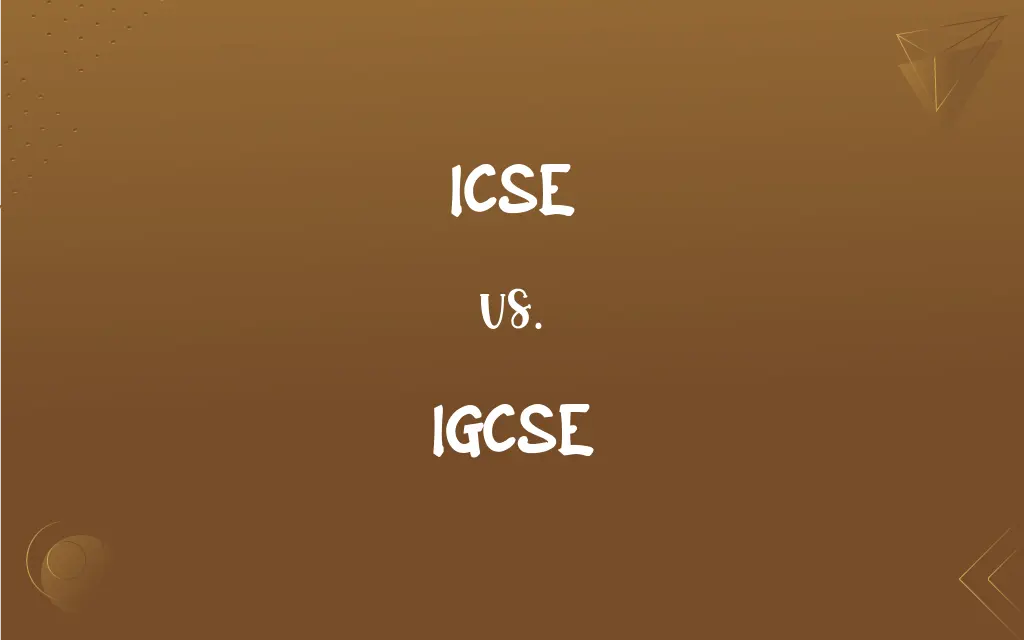ICSE vs. IGCSE: What's the Difference?
Edited by Aimie Carlson || By Janet White || Published on February 29, 2024
ICSE (Indian Certificate of Secondary Education) is an Indian board focusing on a comprehensive and balanced curriculum, while IGCSE (International General Certificate of Secondary Education) is a globally recognized qualification by Cambridge.

Key Differences
The ICSE curriculum, governed by the Council for the Indian School Certificate Examinations (CISCE), emphasizes a detailed study of a wide range of subjects, aiming for a holistic educational approach. It encourages in-depth understanding and application-based learning. In contrast, the IGCSE, developed by the University of Cambridge International Examinations, is recognized internationally and focuses on preparing students for higher education with a global perspective. It offers a flexible curriculum with a variety of subject choices.
ICSE is known for its focus on language and literature, with a strong emphasis on English, which is beneficial for students aiming for proficiency in English. It also includes a variety of subjects, including environmental education. IGCSE, on the other hand, offers a more diverse subject pool, including over 70 subjects, and allows students to take a minimum of 5 and a maximum of 14 subjects. The flexibility in choosing subjects in IGCSE caters to a wide range of interests and career aspirations.
Assessment in ICSE is thorough, with a focus on internal assessments and final examinations that test a student’s analytical abilities and understanding of concepts. IGCSE assessments are more varied, including oral and listening tests, practicals, and coursework, in addition to written examinations. This approach in IGCSE is aimed at evaluating a range of skills beyond just theoretical knowledge.
ICSE's curriculum is more centered around the Indian context, making it more suitable for students who plan to pursue higher education in India. The IGCSE curriculum is designed with a global outlook, making it a preferred choice for students aiming for international education or careers. The international recognition of IGCSE facilitates easier mobility for students globally.
In terms of academic rigor, both ICSE and IGCSE are challenging, but they differ in their approach and focus areas. ICSE emphasizes balanced learning across a spectrum of subjects, whereas IGCSE allows students to specialize in subjects of their choice, providing a more tailored educational experience.
ADVERTISEMENT
Comparison Chart
Governing Body
Council for the Indian School Certificate Examinations (CISCE)
University of Cambridge International Examinations
Curriculum Focus
Comprehensive, balanced, with focus on English and environmental education
Flexible, international, with a wide choice of subjects
Assessment Methodology
Emphasis on final exams and internal assessments
Varied assessments including coursework, practicals, and written exams
Geographical Suitability
More suitable for education in India
Designed for global recognition, suitable for international education
Academic Approach and Rigor
Focuses on a broad range of subjects with detailed study
Offers specialization in chosen subjects with a global perspective
ADVERTISEMENT
ICSE and IGCSE Definitions
ICSE
ICSE is an Indian board of education that conducts the ICSE examination for Grade 10.
Rahul scored well in his ICSE exams, excelling in all subjects.
IGCSE
The IGCSE board is designed for students seeking international education and career opportunities.
Studying under IGCSE helped her adapt to the education system abroad easily.
ICSE
The ICSE curriculum is known for its focus on English and environmental education.
Her command over English improved significantly after studying under the ICSE syllabus.
IGCSE
IGCSE is an internationally recognized qualification by Cambridge for secondary school students.
He received his IGCSE diploma, which is accepted by universities around the world.
ICSE
The ICSE board aims to provide a balanced education that nurtures analytical and application skills.
The science projects in ICSE schools encourage practical application of theoretical knowledge.
IGCSE
IGCSE is known for its flexible curriculum and assessment methods including coursework and practical exams.
The IGCSE program allowed him to demonstrate his skills through various forms of assessments.
ICSE
ICSE is suitable for students planning to continue higher education in India.
Most of her classmates in ICSE plan to attend prestigious Indian universities.
IGCSE
The IGCSE curriculum offers a wide choice of subjects, promoting a global educational perspective.
She chose unusual subjects like global perspectives and Spanish in IGCSE.
ICSE
ICSE emphasizes comprehensive learning across various subjects.
ICSE students often participate in diverse co-curricular activities as part of their education.
IGCSE
IGCSE allows specialization in subjects, tailored to students' interests and career goals.
In IGCSE, he focused on science and math, aligning with his engineering aspirations.
FAQs
What does ICSE stand for?
Indian Certificate of Secondary Education.
What is the focus of the ICSE curriculum?
Comprehensive education with a strong emphasis on English and environmental education.
How is IGCSE recognized globally?
It is internationally recognized and accepted by universities and institutions worldwide.
What makes IGCSE suitable for international students?
Its global perspective and flexible curriculum make it suitable for international education.
What are the benefits of an IGCSE education?
Flexibility, international recognition, and a wide subject choice.
How many subjects must IGCSE students take?
They must take a minimum of 5 subjects.
Can IGCSE students choose their subjects?
Yes, they have a wide range of subjects to choose from.
Are ICSE exams conducted only in India?
Primarily, yes, they are tailored for students in India.
How are students assessed in ICSE?
Through a combination of final exams and internal assessments.
Is English a compulsory subject in ICSE?
Yes, English is a core subject in the ICSE curriculum.
Can IGCSE students study higher education in India?
Yes, many Indian universities accept IGCSE qualifications.
What is the unique feature of IGCSE assessments?
They include varied methods like coursework, practicals, and oral exams.
Is ICSE recognized outside India?
It's recognized but more suited for higher education within India.
Are ICSE exams more challenging than IGCSE?
Both have their rigor, but the style and focus of assessments differ.
Which is better for studying in India, ICSE or IGCSE?
ICSE is more tailored to the Indian education system.
Can students transfer from ICSE to IGCSE schools easily?
Transfer is possible, but adjustments to the different curriculum styles are needed.
Is IGCSE accepted by all international universities?
Most international universities accept it, but specific requirements vary.
Does IGCSE provide a good foundation for international careers?
Yes, its global perspective prepares students well for international careers.
Do ICSE and IGCSE follow the same grading system?
No, they have different grading systems.
What career paths do ICSE students typically pursue?
Many pursue diverse paths, often continuing in Indian universities.
About Author
Written by
Janet WhiteJanet White has been an esteemed writer and blogger for Difference Wiki. Holding a Master's degree in Science and Medical Journalism from the prestigious Boston University, she has consistently demonstrated her expertise and passion for her field. When she's not immersed in her work, Janet relishes her time exercising, delving into a good book, and cherishing moments with friends and family.
Edited by
Aimie CarlsonAimie Carlson, holding a master's degree in English literature, is a fervent English language enthusiast. She lends her writing talents to Difference Wiki, a prominent website that specializes in comparisons, offering readers insightful analyses that both captivate and inform.































































